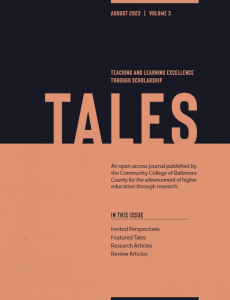Many pedagogical achievements have been born in the prolific incubators of community college classrooms. Faculty and staff have transformed these big ideas about teaching and learning into practical applications now mirrored in community college classrooms across the country. After reading the third volume of CCBC’s own journal, TALES: Teaching and Learning Excellence Through Scholarship, I am reminded of the invaluable role these periodicals play in highlighting the dual identity of faculty as both educators and scholars.
When I first learned of TALES, I thought the acronym sounded more suggestive of a compendium of fairy tales, but this could not be further from the truth. Peer-reviewed and fully documented, this professional journal is worthy of the scholars committed to creating it. Academics from an array of disciplines continue to endow it with a legacy of scholarly insight into classroom and teaching methodology. And yet, community college faculty and professional staff are often dismissed as second-class scholars, thinkers, writers, and researchers, diminishing the worth of community college engagement on an intellectual level.
 It is true that in the community college world, we are fundamentally “teaching institutions,” hiring faculty, first and foremost, for their pedagogical skills in the classroom. But we also value the breadth of knowledge in their discipline that they bring to our colleges. They take risks combining pedagogical theory with the magic of the community college’s open-door mission, creating strong academic work that often comes at a cost. As teachers first, faculty take on heavy workloads; a 15-hour teaching load does not leave much room for other pursuits. Still, many community college faculty make time to explore the intellectual essence of their disciplines, contributing to the collective wisdom of higher education.
It is true that in the community college world, we are fundamentally “teaching institutions,” hiring faculty, first and foremost, for their pedagogical skills in the classroom. But we also value the breadth of knowledge in their discipline that they bring to our colleges. They take risks combining pedagogical theory with the magic of the community college’s open-door mission, creating strong academic work that often comes at a cost. As teachers first, faculty take on heavy workloads; a 15-hour teaching load does not leave much room for other pursuits. Still, many community college faculty make time to explore the intellectual essence of their disciplines, contributing to the collective wisdom of higher education.
There are creative, curious, and intellectual minds at community colleges, equal to those at our four-year university partners, although not always recognized as such. The powerful perspectives woven into the several community college journals published across the nation reflect a diverse and thriving community of scholars who are, first and foremost, teachers, but who also champion intellectual exploration for their students and for themselves. Community college journals are a repository of knowledge; they are a testament to the dedication and innovation of educators. From pioneering teaching practices to inclusive learning strategies, their ideas contribute to an exchange that cultivates the seed of pedagogical excellence at community colleges and beyond.
